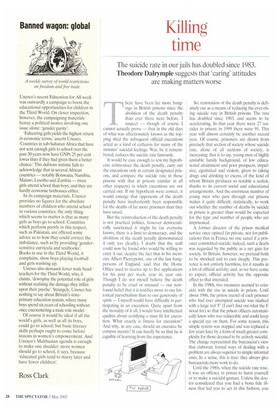Banned wagon: global
Unesco's recent Education for All week was outwardly a campaign to boost the educational opportunities for children in the Third World. On closer inspection, however, the campaigning materials betray a political motive involving one issue alone: 'gender parity'.
'Educating girls yields the highest return in economic terms,' asserts Unesco. 'Countries in sub-Saharan Africa that have not sent enough girls to school over the past 30 years now have GNPs 25 per cent lower than if they had given them a better chance.' This dubious statistic fails to acknowledge that in several African countries — notably Botswana, Namibia, Malawi, Lesotho and Zambia — more girls attend school than boys; and they are hardly economic hothouses either.
In its campaign materials, Unesco provides no figures for the absolute numbers of children who attend school in various countries; the only thing which seems to matter is that as many girls as boys go to school. Countries which perform poorly in this respect, such as Pakistan, are offered some advice as to how they could correct the imbalance, such as by providing 'gendersensitive curricula and textbooks'. Books in use in the Third World, it complains, show boys playing football and girls washing up.
Unesco also demands fewer male headteachers for the Third World, who, it claims, 'downplay the potential role of girls without realising the damage they inflict upon their psyche'. Strangely, Unesco has nothing to say about Britain's stateprimary education system, where many boys spend six years of schooling without once encountering a male role model.
Of course it would be ideal if all the world's girls, as well as all its boys, could go to school; but basic literacy skills perhaps ought to come before lessons in women's empowerment. And Unesco's Malthusian agenda is enough to make one shudder: more women should go to school, it says, because 'educated girls tend to marry later and have fewer children'.
Ross Clark










































































 Previous page
Previous page